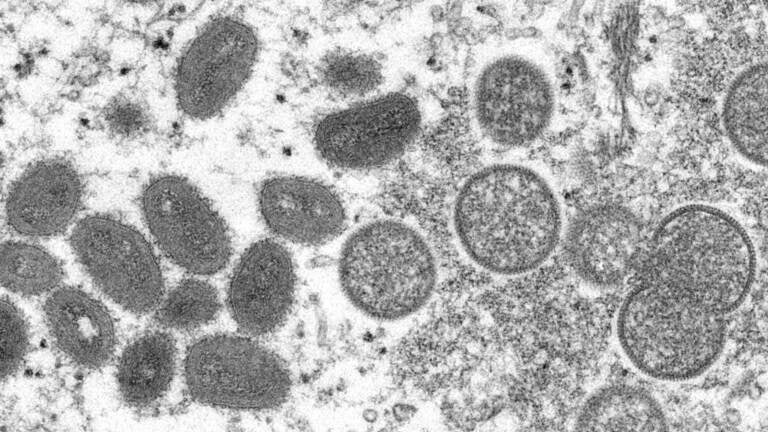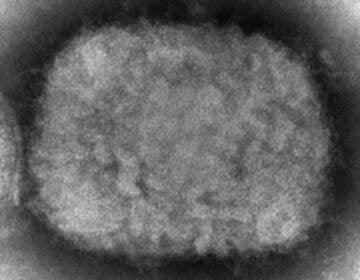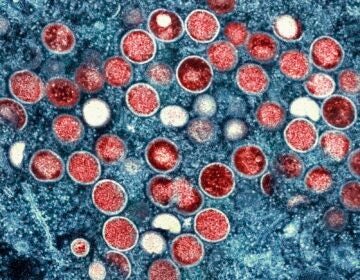Delaware’s first monkeypox patient is a 41-year-old New Castle County man
The man is believed to have contracted the virus through intimate contact with another person. The virus can cause painful blisters and scarring.

File photo: This 2003 electron microscope image made available by the CDC shows mature, oval-shaped monkeypox virus particles, left, and spherical immature particles, right. (Cynthia S. Goldsmith, Russell Regner/CDC via AP)
A 41-year-old New Castle County man has been preliminarily diagnosed with monkeypox, marking the first case in Delaware of the rare disease that can cause painful pus-filled blisters and scarring.
The patient, who is self-isolating, did not report any travel or exposure to someone known to have the disease known as MPX. He is believed to have been exposed to the virus after close intimate contact earlier this month with another person, the Division of Public Health announced today.
DPH received test results this week that showed the man had tested positive. The U.S.Centers for Disease Control and Prevention is now conducting tests to confirm those results.
Delaware health officials are working with the patient to identify any possible close contacts, and are consulting with the CDC to determine the best course of treatment. Currently, there is no specific treatment for monkeypox virus infection, DPH officials said, adding that smallpox vaccine, antivirals, and vaccinia immune globulin (VIG) can be used instead.
“We encourage Delawareans to be aware of being in close intimate contact with individuals who have rashes or flu-like symptoms,’’ said Dr. Rick Hong, public health’s interim director. “We will continue to monitor this situation closely.”
Hong’s office said transmission of MPX occurs when a person encounters the virus from an animal, human, or materials contaminated with the virus. The virus enters the body through broken skin even if not visible. It can also spread through the respiratory tract, or the mucous membranes: eyes, nose, or mouth.
Officials also stressed that the “overall risk of MPX is low, generally caused by close intimate contact” but also can spread in several other ways:
- Direct contact with the infectious rash, scabs, or body fluids.
- Respiratory secretions during prolonged, face-to-face contact, or during intimate physical contact, such as kissing, cuddling, or sex.
- Touching items such as clothing or linens that previously touched the infectious rash or body fluids.
- From infected animals, either by being scratched or bitten by the animal or by preparing or eating meat or using products from an infected animal.
In addition, pregnant people can spread the virus to the fetus through the placenta.
The incubation period — the time from infection to symptoms — is typically seven to 14 days.
CDC recommends vaccination for people who have been diagnosed with or exposed to MPX and people who are at higher risk of being exposed to the virus, including:
- People who have been identified as a contact of someone with MPX.
- People who are aware that one of their sexual partners in the past two weeks has been diagnosed with MPX.
- People who had multiple sexual partners in the past 2 weeks in an area with known MPX.
- People whose jobs may expose them to MPX such as laboratory, and some health care or public health workers
To avoid infection, Hong’s office recommends that people:
- Avoid close, skin-to-skin contact with people who have a rash that looks like MPX.
- Do not touch the rash or scabs of a person with MPX.
- Do not kiss, hug, cuddle, or have sex with someone with MPX.
- Do not share eating utensils or cups with a person with MPX.
- Do not handle or touch the bedding, towels, or clothing of a person with MPX.
- Wash your hands often with soap and water or use an alcohol-based hand sanitizer.
The Division of Public Health’s website has more information about MPX management and prevention programs and resources. Information is also available by calling DPH’s Office of Infectious Disease Epidemiology’s emergency number at 888-295-5156.
WHYY is your source for fact-based, in-depth journalism and information. As a nonprofit organization, we rely on financial support from readers like you. Please give today.






